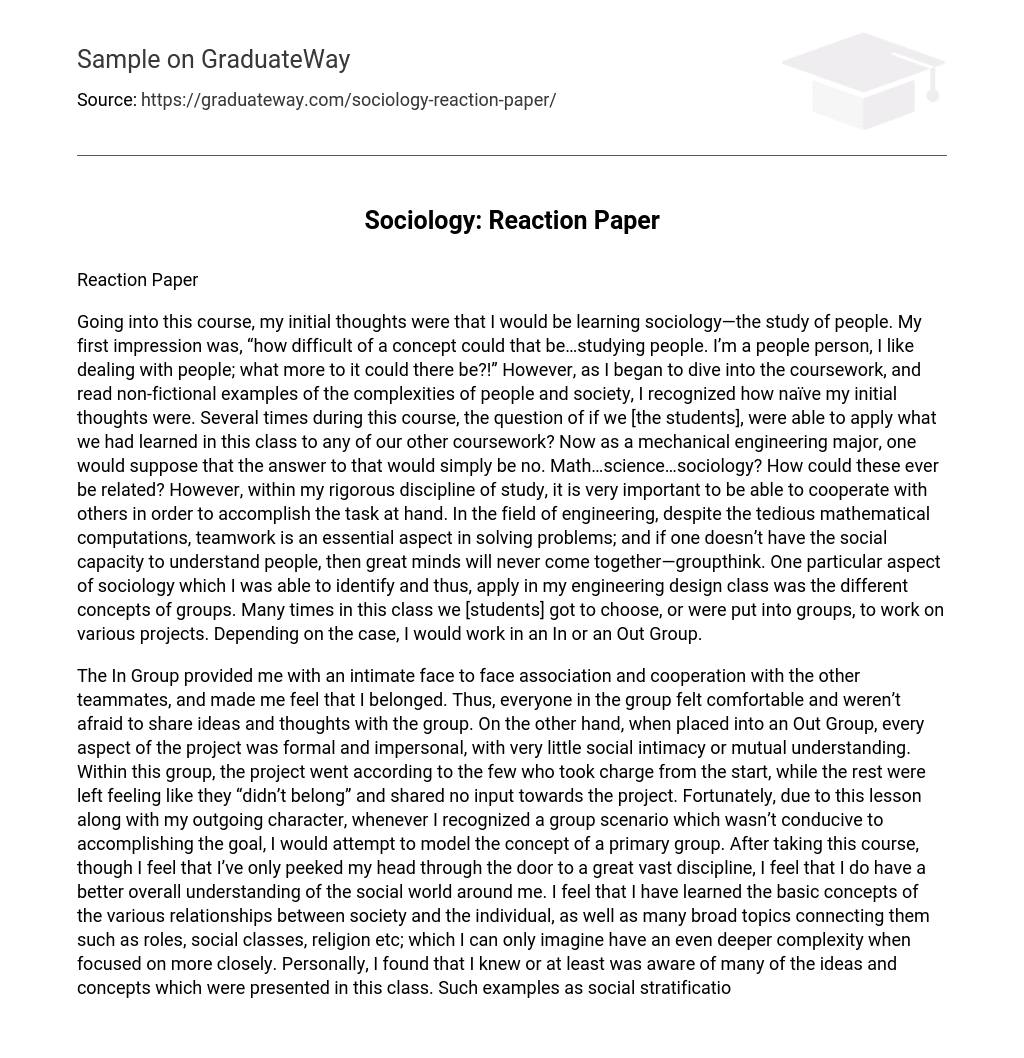Reaction Paper
Going into this course, my initial thoughts were that I would be learning sociology—the study of people. My first impression was, “how difficult of a concept could that be…studying people. I’m a people person, I like dealing with people; what more to it could there be?!” However, as I began to dive into the coursework, and read non-fictional examples of the complexities of people and society, I recognized how naïve my initial thoughts were. Several times during this course, the question of if we [the students], were able to apply what we had learned in this class to any of our other coursework? Now as a mechanical engineering major, one would suppose that the answer to that would simply be no. Math…science…sociology? How could these ever be related? However, within my rigorous discipline of study, it is very important to be able to cooperate with others in order to accomplish the task at hand. In the field of engineering, despite the tedious mathematical computations, teamwork is an essential aspect in solving problems; and if one doesn’t have the social capacity to understand people, then great minds will never come together—groupthink. One particular aspect of sociology which I was able to identify and thus, apply in my engineering design class was the different concepts of groups. Many times in this class we [students] got to choose, or were put into groups, to work on various projects. Depending on the case, I would work in an In or an Out Group.
The In Group provided me with an intimate face to face association and cooperation with the other teammates, and made me feel that I belonged. Thus, everyone in the group felt comfortable and weren’t afraid to share ideas and thoughts with the group. On the other hand, when placed into an Out Group, every aspect of the project was formal and impersonal, with very little social intimacy or mutual understanding. Within this group, the project went according to the few who took charge from the start, while the rest were left feeling like they “didn’t belong” and shared no input towards the project. Fortunately, due to this lesson along with my outgoing character, whenever I recognized a group scenario which wasn’t conducive to accomplishing the goal, I would attempt to model the concept of a primary group. After taking this course, though I feel that I’ve only peeked my head through the door to a great vast discipline, I feel that I do have a better overall understanding of the social world around me. I feel that I have learned the basic concepts of the various relationships between society and the individual, as well as many broad topics connecting them such as roles, social classes, religion etc; which I can only imagine have an even deeper complexity when focused on more closely. Personally, I found that I knew or at least was aware of many of the ideas and concepts which were presented in this class. Such examples as social stratification or looking-glass self are present in everyday life. For me, this course actually broke down these aspects of social life that I knew existed; yet classified and named them in order to observe and study them further.
Now when I view individuals or groups, I recognize the complexity to their formation or being in the social world; with respect to their race, gender, religion, attitude, grouping, classification etc. Furthermore, I would like to think that after taking this course, I am a little less judgmental and biased towards certain people and groups. Looking back over the course, I found the slides, as well the in-class discussions based on our readings to be quite helpful. I felt that the writings published in the “Understanding Society” were helpful because they provided us with core examples which aided in whatever lesson and terms we learned from the textbook. In addition, though I did miss a couple, I thought that the weekly quizzes were beneficial and helped keep me up-to-date with the course work. In contrast, though I don’t believe anything particular hindered my learning, I do feel that there should be additional “field” work –like that of the social location and random acts of kindness activities.
These activities were fun and exciting, while emphasizing the coursework learned from class and the text. Also, perhaps there could be more hands-on activities that can be done in class to accompany our discussions. In conclusion, I am very pleased that I was able to take this course and expand my horizons. Despite this class “supposedly” straying from my major’s course requirements, it actually has benefited me in my field, and has provided me with a new understanding of the social world. Looking towards the future, I plan on practicing “personal sociology” by being more aware of what I watch on television, the stores I shop in, and generally recognizing and taking responsibility for the impacts that my actions have on others and society.





